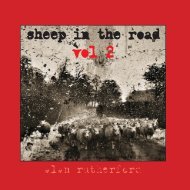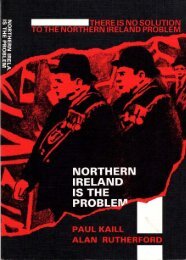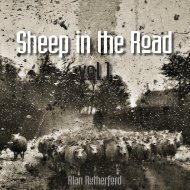- Page 1: HAND OVER FIST PRESS SHEEP IN THE R
- Page 5 and 6: This Volume’s CONTENTS ----------
- Page 7 and 8: ANOTHER OPENING -------------------
- Page 9: HAND OVER FIST PRESS SHEEP IN THE R
- Page 12 and 13: SHEEP IN THE ROAD : NUMBER TEN
- Page 14 and 15: 2 SHEEP IN THE ROAD : NUMBER TEN
- Page 16 and 17: DMITRY- MOOR DMITRY MOOR BOLSHEVIK
- Page 18 and 19: The black-and-white ink drawing, wh
- Page 21 and 22: In 1928-1932 he was a member of the
- Page 23 and 24: THE CRIME OF WAR An excerpt - Wilfr
- Page 25 and 26: ook ExcERpt 13 MAY DAY 2016
- Page 27 and 28: 15 MAY DAY 2016
- Page 29 and 30: ook ExcERpt September 2013 | coldty
- Page 31 and 32: 19 September 2013 | coldtype 27 MAY
- Page 33 and 34: US ELECTIONS: BEFORE BERNIE SANDERS
- Page 35 and 36: He ran again in 1904 (gaining 3 per
- Page 37 and 38: Women garment workers on strike in
- Page 39 and 40: 27 MAY DAY 2016
- Page 41 and 42: ARSEHOLES -------------------------
- Page 43 and 44: I’ve seen aggressive and deceitfu
- Page 45 and 46: I think the State in any civilised
- Page 47: 35 MAY DAY 2016
- Page 52 and 53: 40 SHEEP IN THE ROAD : NUMBER TEN
- Page 54 and 55: 42 relief; some paid nothing. Over
- Page 56 and 57: ‘What is so interesting about thi
- Page 58 and 59: 46 IRONICALLY ---------------------
- Page 60 and 61: 48 At this time, socialism was a ne
- Page 62 and 63: 50 bomb was thrown into the police
- Page 64 and 65: 52 Artwork: Vhils Moscow, Russia SH
- Page 66 and 67: 54 SHEEP IN THE ROAD : NUMBER TEN
- Page 68 and 69: 56 With this in mind, it was necess
- Page 70 and 71: 58 Thanks to Li, seemingly anonymou
- Page 72 and 73: 60 28 Millimétres, Women Are Heroe
- Page 74 and 75: 62 MALICK SIDIBÉ 1936-2016 The Mal
- Page 76 and 77: 64 SHEEP IN THE ROAD : NUMBER TEN
- Page 78 and 79: 66 He had started on the left. He w
- Page 80 and 81: 68 SHEEP IN THE ROAD : NUMBER TEN
- Page 82 and 83: HAND OVER FIST PRESS 2 0 1 6
- Page 84 and 85: Panela (unrefined sugarcane), 1918,
- Page 86 and 87: some sort of cock-a-doodledo! 2 SHE
- Page 88 and 89: 4 Sykes & Picot border mischief! SH
- Page 90 and 91: 6 of Iraq to the British - are know
- Page 92 and 93: 8 transnational existence is assure
- Page 94 and 95: eprise ffs! Jez for Prez shit... lo
- Page 96 and 97: THE TOPICAL TIMES FOR THESE TIMES B
- Page 98 and 99:
14 Now, there is - sad to say - an
- Page 100 and 101:
16 SHEEP IN THE ROAD : NUMBER ELEVE
- Page 102 and 103:
18 From acres of newsprint here is
- Page 104 and 105:
20 adventure, and that individual p
- Page 106 and 107:
22 SHEEP IN THE ROAD : NUMBER ELEVE
- Page 108 and 109:
24 SHEEP IN THE ROAD : NUMBER ELEVE
- Page 110 and 111:
26 SHEEP IN THE ROAD : NUMBER ELEVE
- Page 112 and 113:
28 SHEEP IN THE ROAD : NUMBER ELEVE
- Page 114 and 115:
30 SHEEP IN THE ROAD : NUMBER ELEVE
- Page 116 and 117:
32 teatime in tewkesbury SHEEP IN T
- Page 118 and 119:
34 SHEEP IN THE ROAD : NUMBER ELEVE
- Page 120 and 121:
36 SHEEP IN THE ROAD : NUMBER ELEVE
- Page 122 and 123:
ET 38 SHEEP IN THE ROAD : NUMBER EL
- Page 124 and 125:
40 SHEEP IN THE ROAD : NUMBER ELEVE
- Page 126 and 127:
42 SHEEP IN THE ROAD : NUMBER ELEVE
- Page 128 and 129:
44 Across South Africa, urban land
- Page 130 and 131:
46 recognition and inclusion could
- Page 132 and 133:
48 to regain control over territori
- Page 134 and 135:
50 force that is understood to have
- Page 136 and 137:
52 SHEEP IN THE ROAD : NUMBER ELEVE
- Page 138 and 139:
noise to enter the microphone on bo
- Page 140 and 141:
capitalism just does not work, i’
- Page 142 and 143:
EXHIBITION A NEW CHILDHOOD PICTURE
- Page 144 and 145:
60 Writing worth reading Photos wor
- Page 146 and 147:
62 SHEEP IN THE ROAD : NUMBER ELEVE
- Page 148 and 149:
HAND OVER FIST PRESS 2 0 1 6
- Page 150 and 151:
Artwork: Jack Hurley https://loudri
- Page 152 and 153:
2 SHEEP IN THE ROAD : NUMBER TWELVE
- Page 154 and 155:
NHS The collective principle assert
- Page 156 and 157:
Then, the only option that blinkere
- Page 158 and 159:
8 SHEEP IN THE ROAD : NUMBER TWELVE
- Page 160 and 161:
Writing about his involvement on Dr
- Page 162 and 163:
Much had changed since the early da
- Page 164 and 165:
That issue was ignored by the gover
- Page 166 and 167:
Read more, see more photographs …
- Page 168 and 169:
Of cabbages and kings 18 And whethe
- Page 170 and 171:
A SQUARE PEGIN THE ROUND 20 SHEEP I
- Page 172 and 173:
22 Spinoza and Hume met up in the v
- Page 174 and 175:
24 SHEEP IN THE ROAD : NUMBER TWELV
- Page 176 and 177:
26 ANGLO-MYTHOLOGY of forage propor
- Page 178 and 179:
capitalism just does not work, i’
- Page 180 and 181:
30 Writing worth reading Photos wor
- Page 182 and 183:
32 SHEEP IN THE ROAD : NUMBER TWELV
- Page 184 and 185:
HAND OVER FIST PRESS 2 0 1 6
- Page 186 and 187:
SHEEP IN THE ROAD : NUMBER 13
- Page 188 and 189:
2 SHEEP IN THE ROAD : NUMBER 13
- Page 190 and 191:
4 SHEEP IN THE ROAD : NUMBER 13
- Page 192 and 193:
6 Just imagine what could buy for t
- Page 194 and 195:
8 NHS Solidarity - supported by doc
- Page 196 and 197:
10 Hunt has succeeded in uniting do
- Page 198 and 199:
12 SHEEP IN THE ROAD : NUMBER 13
- Page 200 and 201:
14 SHEEP IN THE ROAD : NUMBER 13
- Page 202 and 203:
16 Over an hour of deliberations we
- Page 204 and 205:
18 Us kids ran alongside shouting a
- Page 206 and 207:
20 SHEEP IN THE ROAD : NUMBER 13
- Page 208 and 209:
22 SHEEP IN THE ROAD : NUMBER 13
- Page 210 and 211:
24 SHEEP IN THE ROAD : NUMBER 13
- Page 212 and 213:
towards a printer offering a very c
- Page 214 and 215:
THE 28 EVOLUTION CODE SHEEP IN THE
- Page 216 and 217:
30 SHEEP IN THE ROAD : NUMBER 13
- Page 218 and 219:
capitalism just does not work, i’
- Page 220 and 221:
34 Writing worth reading Photos wor
- Page 222 and 223:
36 SHEEP IN THE ROAD : NUMBER 13
- Page 224 and 225:
HAND OVER FIST PRESS 2 0 1 6
- Page 226 and 227:
SHEEP IN THE ROAD : NUMBER 14
- Page 228 and 229:
d SHEEP IN THE ROAD : NUMBER 14
- Page 230 and 231:
2 SHEEP IN THE ROAD : NUMBER 14
- Page 232 and 233:
4 SHEEP IN THE ROAD : NUMBER 14
- Page 234 and 235:
Mahal, Damon Albarn and Paul Simon
- Page 236 and 237:
8 SHEEP IN THE ROAD : NUMBER 14
- Page 238 and 239:
In the 1960s when the CND peace sym
- Page 240 and 241:
12 SHEEP IN THE ROAD : NUMBER 14
- Page 242 and 243:
¿Dónde están los baños? 14 ‘E
- Page 244 and 245:
16 ALL ANIMALS ARE EQUAL BUT SOME A
- Page 246 and 247:
From someone with left leanings, an
- Page 248 and 249:
The argument of those who brought i
- Page 250 and 251:
And none of them attempt to assess
- Page 252 and 253:
24 SHEEP IN THE ROAD : NUMBER 14
- Page 254 and 255:
The Pirate Party is backed by almos
- Page 256 and 257:
28 SHEEP IN THE ROAD : NUMBER 14
- Page 258 and 259:
KISS- The previous image is the inf
- Page 260 and 261:
32 SHEEP IN THE ROAD : NUMBER 14
- Page 262 and 263:
34 SHEEP IN THE ROAD : NUMBER 14
- Page 264 and 265:
Dr Tony Xia bought Aston Villa for
- Page 266 and 267:
38 SHEEP IN THE ROAD : NUMBER 14
- Page 268 and 269:
40 Use this virtual keyboard, write
- Page 270 and 271:
42 Writing worth reading Photos wor
- Page 272 and 273:
44 SHEEP IN THE ROAD : NUMBER 14
- Page 274 and 275:
HAND OVER FIST PRESS 2 0 1 6
- Page 276 and 277:
SHEEP IN THE ROAD : NUMBER 15
- Page 278 and 279:
d SHEEP IN THE ROAD : NUMBER 15
- Page 280 and 281:
2 RODCHENKO & STEPANOVA CONSTRUCTIV
- Page 282 and 283:
4 SHEEP IN THE ROAD : NUMBER 15
- Page 284 and 285:
And more brutally Herman Goering’
- Page 286 and 287:
8 SHEEP IN THE ROAD : NUMBER 15
- Page 288 and 289:
Great Zimbabwe was constructed betw
- Page 290 and 291:
Great Zimbabwe’s prosperity came
- Page 292 and 293:
14 Notable features of the Hill Com
- Page 294 and 295:
Reconstruction attempts by Zimbabwe
- Page 296 and 297:
GOVERNMENT POLICY 18 IN THE UK ...
- Page 298 and 299:
20 SHEEP IN THE ROAD : NUMBER 15
- Page 300 and 301:
22 SHEEP IN THE ROAD : NUMBER 15
- Page 302 and 303:
An increasingly obvious truism is t
- Page 304 and 305:
26 SHEEP IN THE ROAD : NUMBER 15
- Page 306 and 307:
Meanwhile statistics collated by UK
- Page 308 and 309:
deliberately hit. The coalition has
- Page 310 and 311:
and democracy, but it is arming and
- Page 312 and 313:
34 SHEEP IN THE ROAD : NUMBER 15
- Page 314 and 315:
collaboration? Why are we not disar
- Page 316 and 317:
38 SHEEP IN THE ROAD : NUMBER 15
- Page 318 and 319:
“He just came in one morning and
- Page 320 and 321:
One strategically vital war, waged
- Page 322 and 323:
The official British position was t
- Page 324 and 325:
After the rebellions of the 1950s,
- Page 326 and 327:
While the Wilson government had eve
- Page 328 and 329:
This war enjoyed early success, but
- Page 330 and 331:
In July 2007, less than a week afte
- Page 332 and 333:
In the Gulf, meanwhile, it was disc
- Page 334 and 335:
56 wonder what they are laughing ab
- Page 336 and 337:
58 SHEEP IN THE ROAD : NUMBER 15
- Page 338 and 339:
Howe was Thatcher’s chancellor an
- Page 340 and 341:
This whole process has made me real
- Page 342 and 343:
64 THE MINERS STRIKE Artwork: Alan
- Page 344 and 345:
66 Crickey ... a virtual keyboard,
- Page 346 and 347:
68 Writing worth reading Photos wor
- Page 348 and 349:
Artwork: still unknown 70 SHEEP IN
- Page 350 and 351:
HAND OVER FIST PRESS 2 0 1 6
- Page 352 and 353:
SHEEP IN THE ROAD : NUMBER 16
- Page 354 and 355:
d SHEEP IN THE ROAD : NUMBER 16
- Page 356 and 357:
2 SHEEP IN THE ROAD : NUMBER 16
- Page 358 and 359:
Artwork: Alan Rutherford FASCIST MO
- Page 360 and 361:
‘My father worked from six in the
- Page 362 and 363:
including the mural. But people con
- Page 364 and 365:
threatened Butler. ‘I had my tyre
- Page 366 and 367:
12 SHEEP IN THE ROAD : NUMBER 16
- Page 368 and 369:
14 During the early years of the 19
- Page 370 and 371:
the unrest Rochdale became a barrac
- Page 372 and 373:
Among the throng on St. Peter’s F
- Page 374 and 375:
conditions. Throughout this whole p
- Page 376 and 377:
22 SHEEP IN THE ROAD : NUMBER 16
- Page 378 and 379:
The political and cultural theorist
- Page 380 and 381:
For now, the Labour membership’s
- Page 382 and 383:
SOCIALISTS SHOULD DEFEND THE RIGHT
- Page 384 and 385:
OK, so you have convinced yourself
- Page 386 and 387:
‘No matter who came knocking at t
- Page 388 and 389:
THE NHS IS THE FLOWER OF THE WELFAR
- Page 390 and 391:
No matter how sick I get No doctor
- Page 393 and 394:
SEYDOU KEÏTA P H O T O G R A P H E
- Page 395 and 396:
41 October 2016
- Page 398 and 399:
TOWNSHIP: LIFE AFTER SO
- Page 400:
46 In the two decades since the end
- Page 403 and 404:
SHARP BARBS DULLED BY IGNORAMUSES &
- Page 405 and 406:
51 October 2016
- Page 407 and 408:
Abbott added: ‘My own privacy has
- Page 409 and 410:
WAR HEADS 55 UK PARLIAMENT+USA+ISRA
- Page 411 and 412:
57 October 2016
- Page 413 and 414:
YEAH, beware, capitalism and war go
- Page 415 and 416:
61 October 2016
- Page 417 and 418:
WAFFLE ----------------------------
- Page 419 and 420:
HAND OVER FIST PRESS SHEEP IN THE R
- Page 421 and 422:
you can’t take it with you
- Page 423 and 424:
The CONTENTS ----------------------
- Page 425 and 426:
OPENING ---------------------------
- Page 427 and 428:
INJUSTICE: ANGOLA THREE From articl
- Page 429 and 430:
After Woodfox and Wallace were alre
- Page 431 and 432:
The state of Louisiana has gone to
- Page 433 and 434:
The order also barred a third trial
- Page 435 and 436:
JUSTICE: MAYBE? Justice is long ove
- Page 437 and 438:
the apartheid government, the indus
- Page 439 and 440:
As the case unfolds, it is critical
- Page 441 and 442:
19 NOVEMBER 2016
- Page 443 and 444:
21 NOVEMBER 2016
- Page 445 and 446:
23 NOVEMBER 2016
- Page 447 and 448:
25 NOVEMBER 2016
- Page 449 and 450:
27 NOVEMBER 2016
- Page 451 and 452:
29 NOVEMBER 2016
- Page 453 and 454:
31 NOVEMBER 2016
- Page 455 and 456:
33 NOVEMBER 2016
- Page 457 and 458:
DISCUSSION A BASIC INCOME? Some Rea
- Page 459 and 460:
A Basic Income will strengthen our
- Page 461 and 462:
NO CLEAN 39 FOR MILLIONS WATER IN T
- Page 463 and 464:
WEST AFRICA NOTES WHILE THE WEST LO
- Page 465 and 466:
43 NOVEMBER 2016
- Page 467 and 468:
45 Considered the property of the E
- Page 469 and 470:
‘We can now hope that these two b
- Page 471 and 472:
49 NOVEMBER 2016
- Page 473 and 474:
LABOUR Artwork: Laura Knight - Ruby
- Page 475 and 476:
53 NOVEMBER 2016
- Page 477 and 478:
never mind ... every president rewa
- Page 479 and 480:
... If you think the High Court is
- Page 481 and 482:
Thursday, 3 November’s judgment w
- Page 483 and 484:
THE RUSSIAN REVOLUTION IN PICTURES
- Page 485 and 486:
Tim talks about how much he learned
- Page 487 and 488:
CUP IN HAND Theresa May has some ch
- Page 489 and 490:
yet-undefined Brexit, opposed by 48
- Page 491 and 492:
THE WHITE POPPY White Poppies are w
- Page 493 and 494:
Many of the activities around Remem
- Page 495 and 496:
hey, beware, capitalism, war, brexi
- Page 497 and 498:
75 NOVEMBER 2016
- Page 499 and 500:
WAFFLE ----------------------------

















